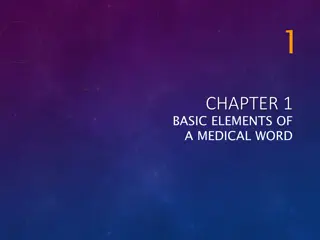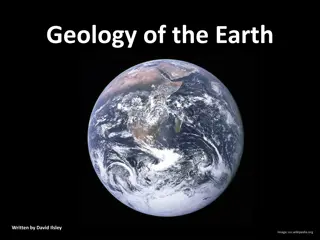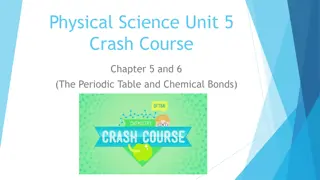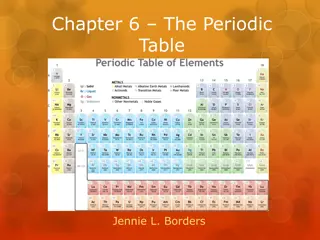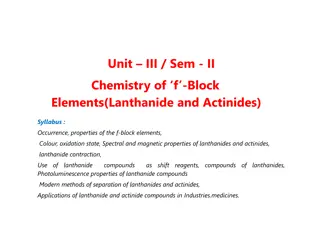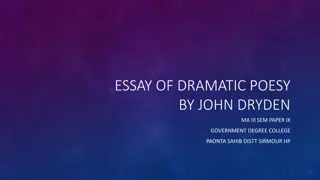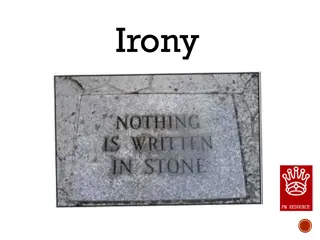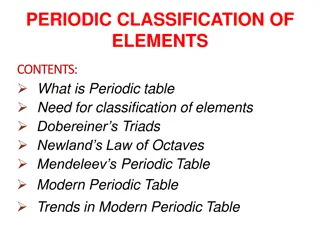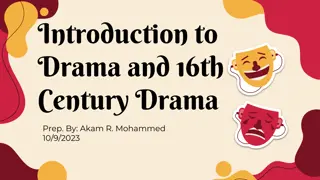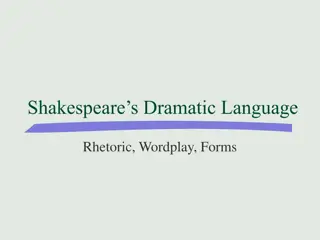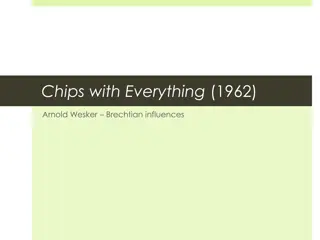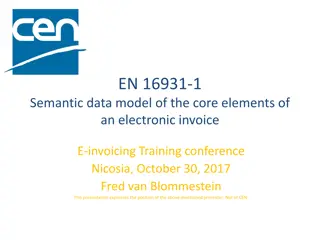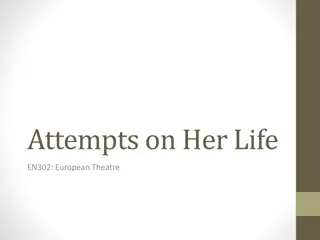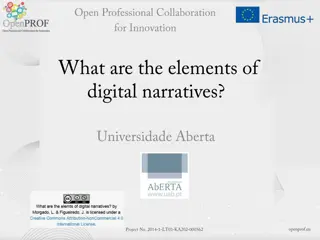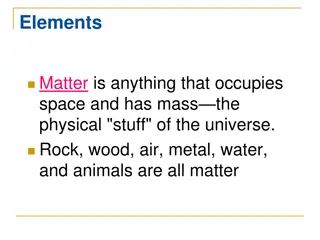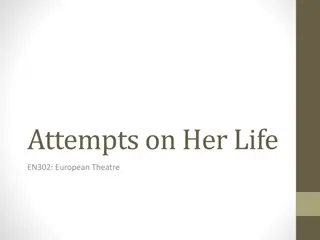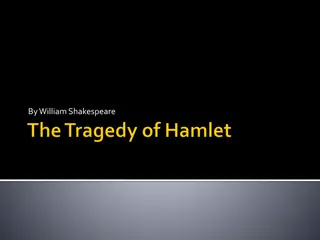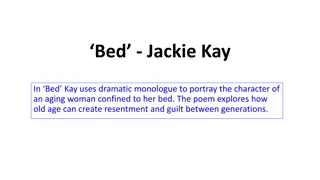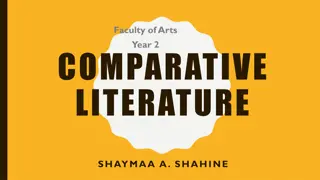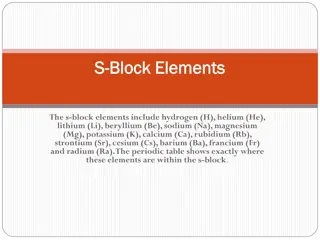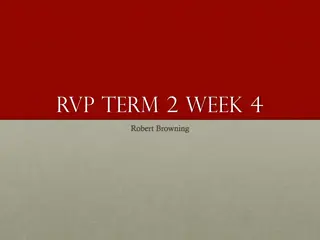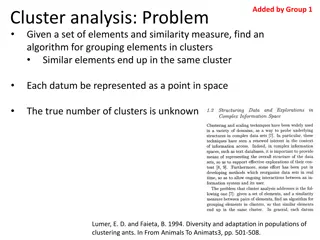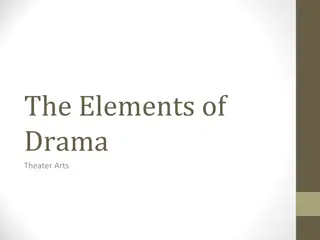Organometallic Compounds of Group 2 Elements
In the realm of organometallic chemistry, Group 2 elements, specifically alkaline earth metals like beryllium and magnesium, exhibit intriguing properties and reactivities. The chemistry of these elements, mimicking that of Group 12 elements in many aspects, leads to the formation of various organom
5 views • 27 slides
Understanding Medical Word Elements: Roots, Combining Forms, Suffixes, and Prefixes
Medical terminology uses word elements like roots, combining forms, suffixes, and prefixes. Word roots provide the main meaning, combining forms connect elements, suffixes modify word meaning, and prefixes are placed at the beginning of words. Examples illustrate how these elements are used in medic
6 views • 13 slides
Geology of the Earth
The evolution of elements in the universe began with the Big Bang, leading to the formation of hydrogen, helium, and heavier elements through stellar processes like fusion and supernovae. Our solar system formed 4.5 billion years ago from a nebula containing a variety of elements. These elements pla
4 views • 44 slides
Understanding the Periodic Table and Chemical Bonds in Physical Science
The periodic table organizes elements based on their properties, with rows representing periods and columns representing groups. Mendeleev's early table laid the foundation for predicting undiscovered elements. Today's periodic table orders elements by atomic number, showcasing the periodic law and
3 views • 15 slides
Understanding the Periodic Table: From Mendeleev to Modern Classification
Organizing elements based on their properties led to the development of the periodic table by Mendeleev with predictions that have stood the test of time. The modern periodic table arranges elements by increasing atomic number, showcasing repeating patterns of properties. It categorizes elements int
1 views • 29 slides
Chemistry of f-Block Elements: Lanthanide and Actinide Series Overview
This segment delves into the properties, occurrence, and unique characteristics of the f-block elements, focusing on the Lanthanide and Actinide series. Covering topics such as color, oxidation states, spectral properties, lanthanide contraction, separation methods, and industrial applications of th
1 views • 15 slides
Overview of Poetry Genres and Elements for English Students
Explore different genres of poetry including narrative, epic, dramatic, satirical, elegy, fable, and prose poetry. Delve into the unique elements of poetry such as diction and figurative devices like simile and metaphor. Engage with various examples from renowned poets and learn about the aesthetic
1 views • 25 slides
Understanding the Key Elements of Tourism
Elements of tourism encompass crucial factors like pleasing weather, scenic attractions, historic and cultural sites, accessibility, amenities, and accommodation. These elements form the foundation of tourism activities worldwide, attracting visitors to destinations globally. From beautiful landscap
1 views • 13 slides
Understanding Soliloquy and Dramatic Monologue in Literature
A soliloquy is a form of monologue where a character speaks to themselves, the audience, or a surrogate, revealing inner thoughts. This presentation explores different types of soliloquies and their significance in literary works, including examples from Shakespeare's Hamlet. Additionally, it delves
0 views • 9 slides
Devising Drama - GCSE Knowledge Organiser
This GCSE Drama Knowledge Organiser provides guidance on devising and performing an original piece of theatre based on a stimulus. It covers how to respond to stimuli, develop ideas for theatrical performances, apply theatrical skills, analyze and evaluate work, and rehearse and refine the devised p
0 views • 10 slides
Debate on Dramatic Poesy by John Dryden
John Dryden's work "Essay of Dramatic Poesy" is a dialogue among four speakers that debates the merit of classical versus modern drama, the comparison between French and English drama, and the use of rhyme in plays. Each speaker presents arguments showcasing their perspectives on these topics, revea
0 views • 5 slides
Understanding Irony in Verbal, Dramatic, and Situational Contexts
Explore the nuances of verbal, dramatic, and situational irony through examples and explanations. Verbal irony involves saying something different from what is meant, often using humor like puns. Dramatic irony occurs when the audience knows something the characters don't, creating suspense. Situati
0 views • 12 slides
Evolution of Periodic Table and Classification of Elements
The Periodic Table is a systematic arrangement of elements based on atomic number and properties. Over time, chemists developed various classification methods such as Dobereiner's Triads, Newland's Law of Octaves, Mendeleev's Periodic Table, and the Modern Periodic Table to organize the increasing n
1 views • 26 slides
Understanding Drama: Elements, Types, and Examples
Drama is a captivating form of literature brought to life by actors on stage. Originating in ancient Greece, drama encompasses key elements like plot, characters, setting, dialogue, and theme. The main types of drama include tragedy, comedy, tragicomedy, and historical drama, each offering unique st
1 views • 25 slides
The Art of Dramatic Writing: Exploring Character Development and Dialectical Approach
Every object and human has multiple dimensions that influence character development in dramatic writing. Understanding the physiological, sociological, and psychological aspects, along with the impact of the environment and dialectical approach, shapes characters' growth and decisions in storytellin
0 views • 12 slides
Insights into Greek Theatre's Renowned Playwrights and Dramatic Elements
Greek theatre history and key figures, including important playwrights like Aeschylus, Sophocles, and Euripides. Aristotle's theories on drama elements, Thespis' innovations, and Aristotle's Unities of Drama are explored. The impact of these elements and playwrights on ancient Greek theatre is highl
7 views • 9 slides
D-Block Elements: Properties and Classification in Chemistry
Welcome to the Department of Chemistry at Kisan Veer Mahavidyalaya, Wai. Explore the Chemistry of Elements of the 3d series, focusing on d-Block Elements and Transition Elements. Learn about their electronic structure, colored ions, magnetic properties, oxidation states, and complex formation. Under
0 views • 34 slides
Exploration of Various Poetry Forms: Descriptive, Narrative, Dramatic, and Metaphysical
Poetry is a diverse art form encompassing descriptive portrayal, storytelling narratives, engaging dialogues, and profound metaphysical insights. Descriptive poetry vividly captures objects and scenes like paintings, narrative poetry weaves interconnected stories, dramatic poetry involves dialogues,
0 views • 11 slides
The Evolution of Drama: A Historical Journey
Drama, originating from ancient Greece, has evolved through the centuries from being a genre of poetry to a distinct theatrical form encompassing tragedy, comedy, and more. The masks of Thalia and Melpomene symbolize the essence of comedy and tragedy, while the Great Dionysia festival in Athens hono
0 views • 41 slides
Understanding Dramatic Monologue in Poetry through "Havisham
Dramatic monologue in poetry is a form where a solitary speaker addresses an audience, offering insight into a character's thoughts and emotions. This exploration often reveals complexities, conflicting viewpoints, and hidden truths. Through examining the character of Miss Havisham from Charles Dick
1 views • 43 slides
Exploring Shakespeare's Dramatic Language and Themes
Shakespeare's dramatic language entails rhetoric, wordplay, and rich forms that offer both pleasure and challenges to readers. His verse showcases density and richness, with characters expressing thoughts through powerful metaphors and figurative language. Examples from "Macbeth" illustrate how imag
0 views • 40 slides
Understanding Irony: Verbal, Dramatic, and Situational Examples
Dive into the world of irony with examples of verbal, dramatic, and situational irony explained through scenarios like sarcastic comments, horror movie twists, and unexpected encounters. Explore how irony adds layers of meaning and depth to storytelling, from characters knowing more than others to o
0 views • 10 slides
Epic Theatre and Brechtian Influences in Modern Drama
Epic theatre, influenced by Bertolt Brecht, challenges traditional Aristotelian and Hegelian dramatic structures by emphasizing critical engagement and distancing strategies. It uses historical narratives and didactic elements to provoke social consciousness and active spectator participation, contr
0 views • 26 slides
Semantic Data Model of Electronic Invoicing Core Elements
Presentation by Fred van Blommestein on the EN16931-1 semantic data model of core elements in electronic invoicing, covering invoice processes, core invoice design, semantic model details, business rules, and invoicing principles. The model includes 160 elements in 33 groups, with mandatory elements
0 views • 13 slides
Exploring European Theatre Traditions
European theatre traditions, as discussed through Lehmann's Postdramatic Theatre and Aristotle's dramatic elements, highlight the unique characteristics that differentiate them from non-European traditions. Concepts such as hamartia, anagnorisis, and mimesis are explored along with the rejection of
0 views • 30 slides
Understanding the 7 Elements of Digital Storytelling
Explore the key components of digital storytelling through elements like narrative structure, point of view, and the use of voice and music. Learn how to keep your audience engaged and focused on the message while incorporating dramatic questions and careful audio choices.
0 views • 12 slides
Exploring "The Sniper" by Liam O'Flaherty: Historical Context and Literary Elements
Delve into the world of "The Sniper" by Liam O'Flaherty with pre-reading notes, background information on the Irish Civil War, and post-reading analysis of literary elements like point of view and irony types. Meet the writer, Liam O'Flaherty, and understand the dramatic and situational ironies used
0 views • 15 slides
Exploring the World of Matter and Elements
Matter is the physical "stuff" of the universe, encompassing elements that make up rocks, wood, air, metals, water, and living organisms. Chemical elements are the building blocks of matter, with essential elements like oxygen, carbon, hydrogen, and nitrogen constituting a significant part of living
0 views • 24 slides
European Theatre: Exploring Dramatic Elements and Themes
European theatre has a rich history and tradition that distinguishes it from other global theatre practices. From Aristotle's dramatic elements to the conflicts faced by characters like Antigone and Creon, this form of theater delves into themes of recognition, imitation, and conflict. Hans-Thies Le
0 views • 35 slides
Shakespearean Dramatic Techniques Analysis
Explore the intricate use of monologues, soliloquies, structural divisions, and emotional responses in William Shakespeare's plays. Delve into the dialogues between characters like Hamlet, Gertrude, and Claudius to uncover themes of love, madness, and expectation. Discover how Shakespeare utilizes d
0 views • 23 slides
Analysis of "Bed" by Jackie Kay: Themes, Form, and Use of Scots
Bed" by Jackie Kay is a dramatic monologue portraying the perspective of an elderly woman confined to her bed, exploring themes of aging, resentment, and guilt between generations. The poem uses Scots to add immediacy to the narrative, highlighting the woman's reliance on her daughter and contemplat
1 views • 34 slides
Exploring Character Creation and Dramatic Conventions in Drama Class
Using a short piece of text as a stimulus, students in a drama class dive into creating characters and exploring dramatic conventions to craft scenes depicting different aspects of their characters' lives. The story unfolds in Hell's Alley, where tension and conflict shape the protagonist's experien
0 views • 10 slides
Exploring Dramatic Forms: From Burlesque to Well-Made Plays
Dive into the world of dramatic forms, where Burlesque emerged in Medieval Drama and was revived in the Seventeenth Century to satirize serious works. Learn about high burlesque that parodies literary works like Alexander Pope's "The Rape of the Lock" and low burlesque that mocks serious subjects. D
0 views • 9 slides
Understanding S-Block Elements in the Periodic Table
The s-block elements in the Periodic Table consist of 14 elements with unique properties and characteristics. Lithium, sodium, and potassium are notable members of Group 1, characterized by their reactivity and ability to form alkaline solutions when in contact with water. These soft metals exhibit
0 views • 23 slides
Analysis of Robert Browning's Dramatic Monologues and Implied Audience
In this content, we delve into the elements found in the dramatic monologues of Robert Browning, focusing on implied addressees, ideal recipients, and the implications of the dramatic form on the relationship between speaker, addressee, and reader. We explore how the presence of an implied audience
0 views • 5 slides
Analysis of Literary Devices in Romeo and Juliet Act 2
In Act 2 of Romeo and Juliet, the characters use various literary devices such as allusion, dramatic irony, hyperbole, and foreshadowing. Mercutio mistakenly believes Romeo is still in love with Rosaline, showcasing dramatic irony. Additionally, Friar Lawrence's words foreshadow the danger in Romeo
0 views • 10 slides
Aerobic Gymnastics Competition Guidelines and Rules
The guidelines for aerobic gymnastics competitions include compulsory elements, categories, competition spaces, deductions, and specific rules for different age groups. The competitions have specific parameters for elements allowed, lifting, floor elements, music length, maximum difficulty elements,
0 views • 17 slides
Understanding Irony: Types, Purpose, and Examples
Irony is about expectations and contrast between reality and what is being said. It can add interest, depth, suspense, and humor to texts. The three types of irony are verbal, dramatic, and situational, each serving a unique purpose to engage the audience. Examples from popular stories like Beauty a
0 views • 12 slides
Cluster Analysis: Grouping Elements into Clusters with Similarity Measures
Given a set of elements and a similarity measure, the algorithm aims to group elements into clusters where similar elements are grouped together. Each element is represented as a point in space, and the true number of clusters is unknown. The clustering algorithm is inspired by the behavior of ants
0 views • 15 slides
Understanding Drama: The Art of Theater Expression
Drama, originating from the Greek word "Dran" meaning to act, is a form of storytelling performed in front of an audience. It differs from prose and poetry by providing a unique experiential aspect through live enactments. Essential elements such as playwrights, actors, acts, scenes, and dramatic sp
0 views • 15 slides

